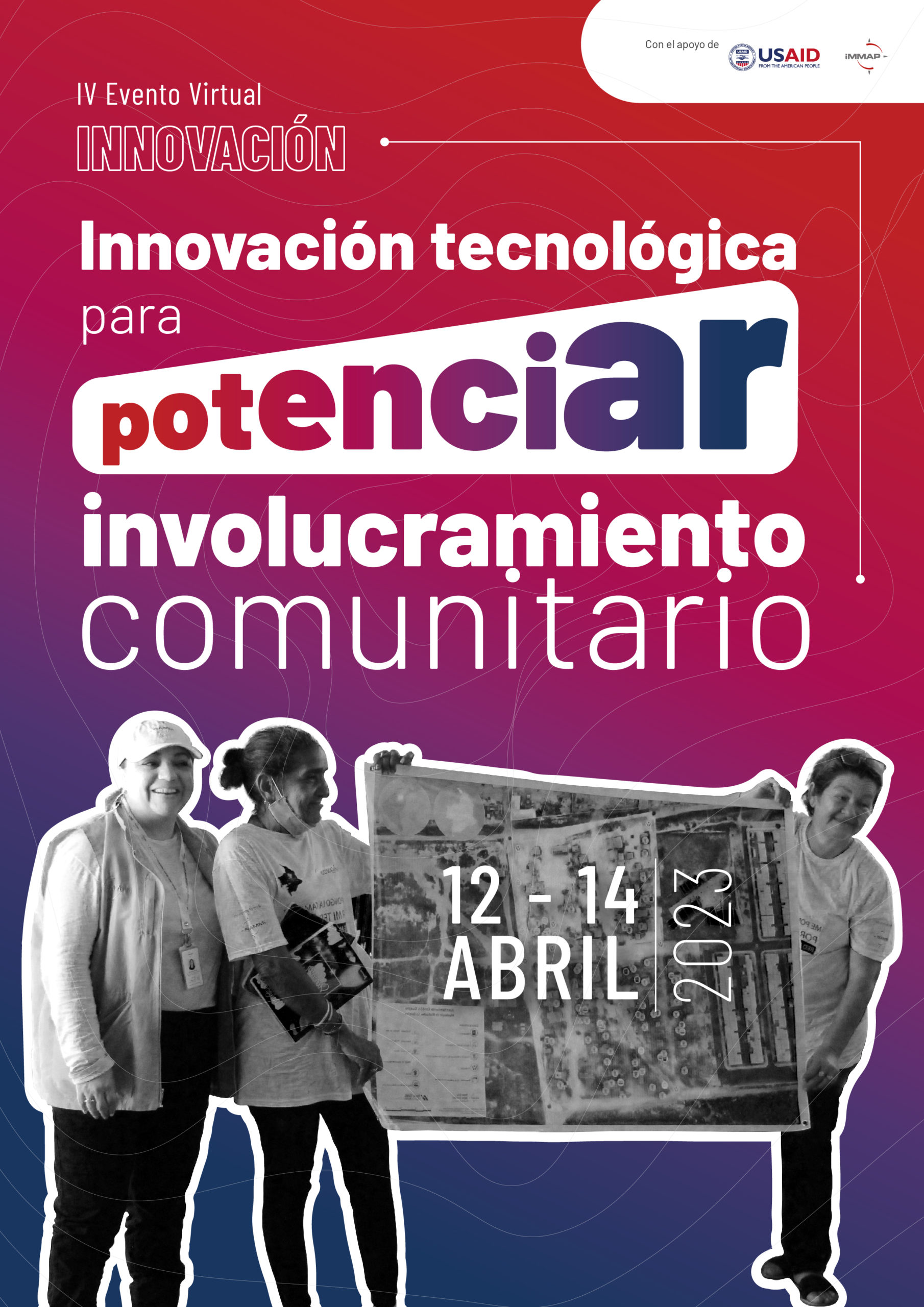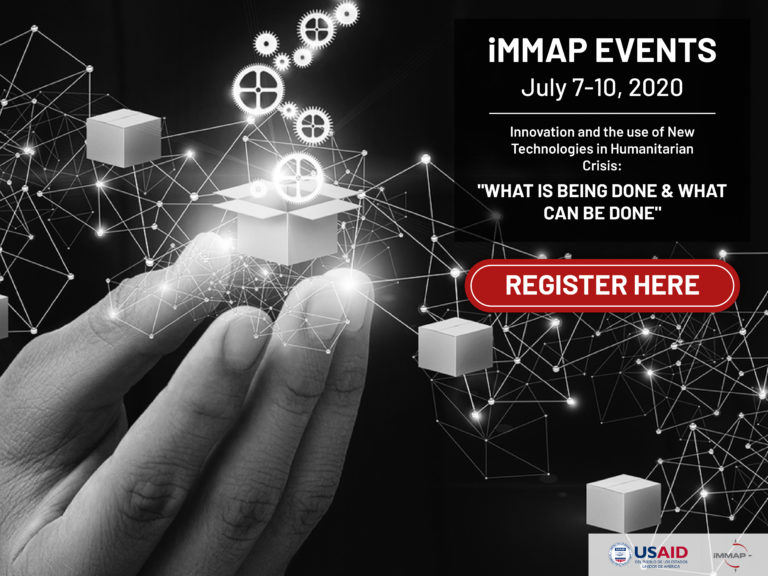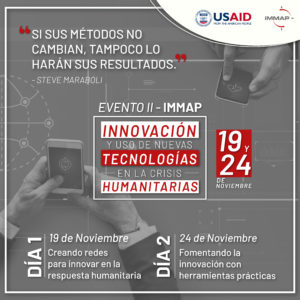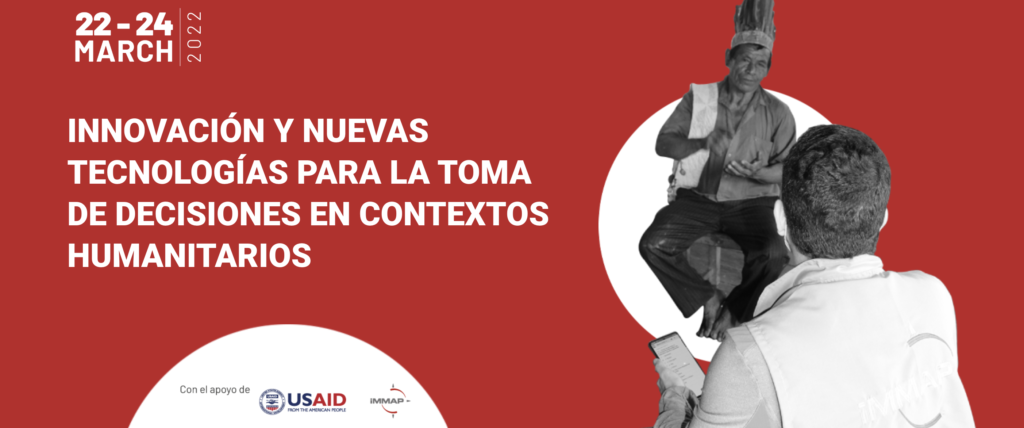PANELISTS AND SPEAKERS
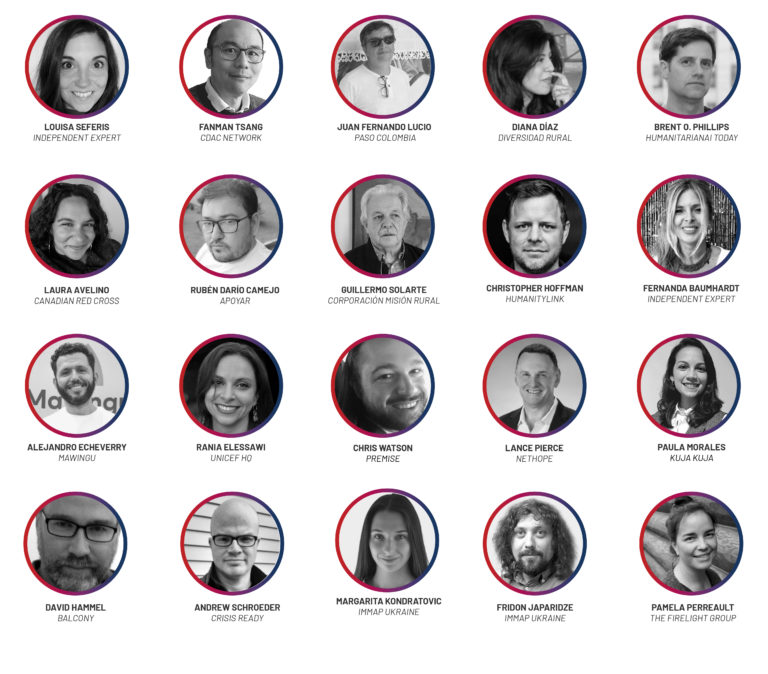
April 12
Rania Elessawi, Unicef HQ

Brent O. Phillips, HumanitarianAI Today

Tech for good project manager, veteran humanitarian relief worker and expert in humanitarian open data sharing frameworks currently heading the Humanitarian AI meetup groups in Cambridge, San Francisco, New York City, London, Toronto, Montreal, Paris, Berlin, Geneva, Zurich, Bangalore and Tokyo and producing our podcast series. humanitarian AI Today. Humanitarian AI is a hybrid meetup community and open source initiative launched to cross-connect AI developers and humanitarian actors and carry out backend research and development work advancing humanitarian uses of artificial intelligence technology.
Chris Watson, Premise

Watson is an evangelist for digital transformation, data-driven decision-making, and increased use of commercial products in the global development industry. He currently leads Premise Data’s international development development division, with a focus on scaling the use of Premise by developing country governments, development donors, and their implementing partners.
Chris and Premise deeply believe that local citizens should have an increased say in defining the challenges and improving development in their local communities. Shifting the task of collecting data and monitoring service delivery to thousands of local residents as gig work democratizes involvement in such issues while providing a supplementary livelihoods strategy.
Lance Pierce, Nethope

David Hammel, Balcony

He studied physics at the Hebrew University of Jerusalem and has a master's degree in security and strategic studies from Tel Aviv University. He is the founder and CEO of Balcony.io, he was also the co-founder and President of Vioozer for 4 years 9 months.
Andrew Schroeder, Crisisready - Direct Relief - WeRobotics

April 13
Paula Morales, Kuja Kuja

Alejandro Echeverry, Mawingu

Fridon Japaridze, iMMAP Ukraine

Margarita Kondratovic, iMMAP Ukrania

Margarita is working with iMMAP in Ukraine as a Programme Coordinator. She is responsible for overseeing projects’ implementation and coordination across projects and departments. She also monitors project activities and results, leads on reporting, and provides support in the coordination the capacity building component of the project. Prior to her current position, Margarita was a monitoring and evaluation (M&E) officer with iMMAP in Ukraine and a reporting officer and a programme assistant with iMMAP in Yemen for nearly four years. Before joining iMMAP, she worked with Relief International and the British Red Cross for two years as a family reunion caseworker and communication and reporting officer. Margarita holds a Bachelor’s Degree in Law from the University of London, and another in International Relations and Arabic language from the University of Westminster, in the United Kingdom. She is fluent in English, Lithuanian, and Russian while having intermediate level of Arabic and Spanish.
Guillermo Solarte Lindo, Corporación Misión Rural

Sociologist Complutense University of Madrid. Expert in qualitative methods and techniques. Leader of local and community participation and communication processes. Expert in the design of toolboxes for the development of social cartography. Director of the Latin American Rural Mission Corporation and Leader of Pacifists Without Borders.
Laura Avelino, Canadian Red Cross
 Laura Avelino comenzó su trabajo en Gestión de Emergencias en 2013 y en el sector humanitario en 2009. Actualmente esGerente Sénior del equipo de Gestión de Información de la Cruz Roja Canadiense, apoyando a los líderes de operaciones de emergencia para tomar decisiones basadas en datos. A lo largo de su carrera, ha adquirido experiencia en el sector de emergencias respondiendo a emergencias locales, nacionales e internacionales en funciones de gestión de operaciones e información. Al centrar los enfoques de sentido común, priorizar la narración de datos y fomentar una cultura de datos, trabaja para implementar soluciones de sentido común dentro de las operaciones de emergencia humanitaria.
Laura Avelino comenzó su trabajo en Gestión de Emergencias en 2013 y en el sector humanitario en 2009. Actualmente esGerente Sénior del equipo de Gestión de Información de la Cruz Roja Canadiense, apoyando a los líderes de operaciones de emergencia para tomar decisiones basadas en datos. A lo largo de su carrera, ha adquirido experiencia en el sector de emergencias respondiendo a emergencias locales, nacionales e internacionales en funciones de gestión de operaciones e información. Al centrar los enfoques de sentido común, priorizar la narración de datos y fomentar una cultura de datos, trabaja para implementar soluciones de sentido común dentro de las operaciones de emergencia humanitaria.
Pamela Perreaul,t The FireLight Group

Pamela Perreault is a member of Garden River First Nation in Ontario and a Director of The Firelight Group. Her academic and consulting careers have taken her across Canada, and around the world in pursuit of knowledge and understanding of Indigenous Peoples’ connection with forested landscapes. She has worked with First Nation governments, regional organizations, NGOs and state governments on projects related to resource policy development and implementation, land-use planning, Indigenous housing, community-based research and the implementation of the UN Declaration on the Rights of Indigenous Peoples (UNDRIP) and Free, Prior and Informed Consent (FPIC) in forest certification.
Fernanda Baumhardt, Independent Expert
 Fernanda Baumhardt is a Brazilian journalist with +25 years of international experience in Communication, Community Engagement and Accountability to Affected People (CCEA). She is a member of CDAC Network expert pool and NORCAP CEA thematic roster since 2015. Recently, has supported NRC Global Innovation Unit leading the first CEA global review and led AAP trainings for IOM Regional Response for Venezuelans (R4V) tailored to CSOs. Previously was assigned as OCHA Regional Office for Latin America and the Caribbean first AAP-CE advisor after being with OCHA Venezuela where she chaired Venezuela’s first AAP Working Group and Task Force to launch the first interagency contact center. Before, has carried out frontline assignments for IFRC, UN Women, WFP and CashCap directly training hundreds of vulnerable and affected communities in +30 countries, mostly youth and women in participatory communications skills, supporting them in recognizing, organizing, and amplifying their own voices and recommendations across the humanitarian architecture.
Fernanda Baumhardt is a Brazilian journalist with +25 years of international experience in Communication, Community Engagement and Accountability to Affected People (CCEA). She is a member of CDAC Network expert pool and NORCAP CEA thematic roster since 2015. Recently, has supported NRC Global Innovation Unit leading the first CEA global review and led AAP trainings for IOM Regional Response for Venezuelans (R4V) tailored to CSOs. Previously was assigned as OCHA Regional Office for Latin America and the Caribbean first AAP-CE advisor after being with OCHA Venezuela where she chaired Venezuela’s first AAP Working Group and Task Force to launch the first interagency contact center. Before, has carried out frontline assignments for IFRC, UN Women, WFP and CashCap directly training hundreds of vulnerable and affected communities in +30 countries, mostly youth and women in participatory communications skills, supporting them in recognizing, organizing, and amplifying their own voices and recommendations across the humanitarian architecture.
April 14
Christopher Hoffman, HumanityLink
 Christopher Hoffman began in the humanitarian industry in 1999. He is currently the Managing Director of Humanity Link (www.humanitylink.org), a corporate to humanitarian brokerage firm that links innovative companies with humanitarian agencies to meaningfully engage and partner in complex environments. By fostering and developing innovative partnerships between the corporate sector, academia, and humanitarian actors he advises a number of organizations and companies on how to develop effective technology towards creating impactful humanitarian programming. He has a solid track record for fundraising and partnership building that has been proven over time, and across five continents.
Christopher Hoffman began in the humanitarian industry in 1999. He is currently the Managing Director of Humanity Link (www.humanitylink.org), a corporate to humanitarian brokerage firm that links innovative companies with humanitarian agencies to meaningfully engage and partner in complex environments. By fostering and developing innovative partnerships between the corporate sector, academia, and humanitarian actors he advises a number of organizations and companies on how to develop effective technology towards creating impactful humanitarian programming. He has a solid track record for fundraising and partnership building that has been proven over time, and across five continents.
Juan Fernando Lucio, PASO Colombia, Fundación One Earth Future

Juan Fernando Lucio is the Director of PASO Colombia (Sustainable Peace for Colombia), a program of the One Earth Future Foundation. This program believes that strategic and inclusive collaboration among all sectors of Colombia's diverse population is key to achieving sustainable peace after decades of civil war. PASO is committed to working with local communities to identify and develop economic opportunities, promote job growth, strengthen the country's social fabric, and foster community responsibility for maintaining long-term stability and peace.
He is an economist from the London School of Economics, holds a Diplome d'Etudes Approdondis from the Ecole des Hautes Etudes en Sciences Sociales in Paris, and has a background in public administration and theology. He is an expert in economic development, program monitoring and evaluation, and social innovation applied to conflict transformation. With skills and experience in management, research, and intercultural dialogue, he adds value to highly qualified interdisciplinary coalitions in designing cultural, institutional, and market initiatives for peace.
Diana Díaz, Diversidad Rural

Diana Díaz is an anthropologist from the National University of Colombia, a specialist in Virtual Learning Environments and an expert in new learning technologies; with more than 23 years of experience looking for permanent education to be a living right in rural communities; She is the author of different methodologies for social innovation in strengthening the individual and organizations. She is the director of Rural Diversity, an organization that provides education with cell phones in rural communities. In 2020, his organization Diversidad Rural was nominated for the "Connecting the Disconnected" award from Impact Engineering and is currently nominated at the "Flower Center" as a finalist for the 2023 Flourish awards for the delivery of the 17 awards for the best published cases. with our history of innovation "ICT in rural areas of Colombia / TIC in rural areas of Colombia"
FanMan Tsang, CDAC Network

Specialises in enabling organisations to utilise the full range of two-way communication systems so that people affected by crises can make informed decisions, misinformation is minimised, and humanitarian actors are accountable to the people they are there to help. He has worked in Asia, Africa, Central America and Europe, and is acknowledged globally as a thought leader. Before entering humanitarian work, he spent 15 years in broadcasting, mostly as a senior producer on the BBC’s network output.
Louisa Seferis, Independent Expert

Louisa is an independent consultant with 14 years of humanitarian experience. Her current portfolio includes technical support and learning on CVA, livelihoods, shock responsive safety nets, and people-centred aid with the IFRC, the Somali Cash Consortium, and the Norwegian Refugee Council. Prior to consulting, she managed the Cash Barometer initiative at Ground Truth Solutions and led the Danish Refugee Council’s work on economic recovery programming.
Rubén Darío Camejo Baquero, Asociación de Apoyo al Desarrollo - APOYAR

Advertising professional, specialist in business development and social management. Expert in public relations and institutional articulation and management of food safety projects.

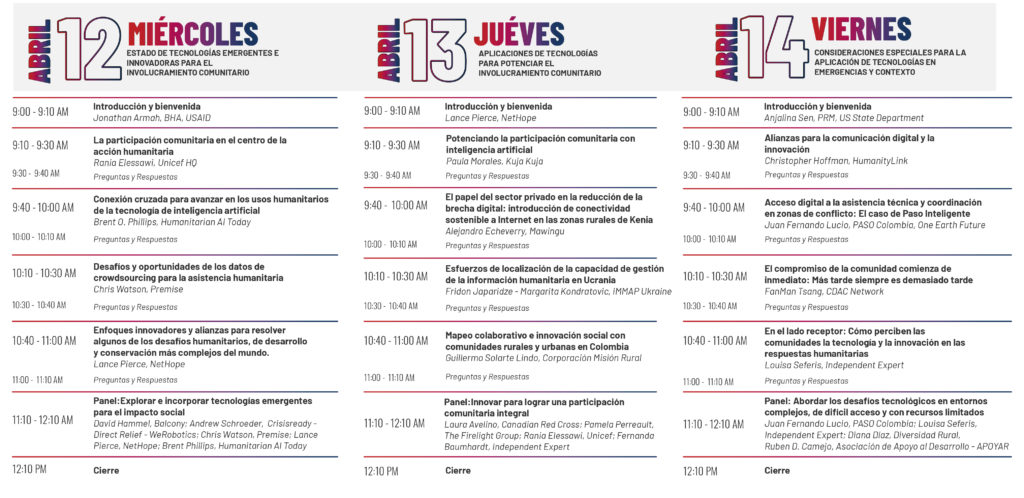
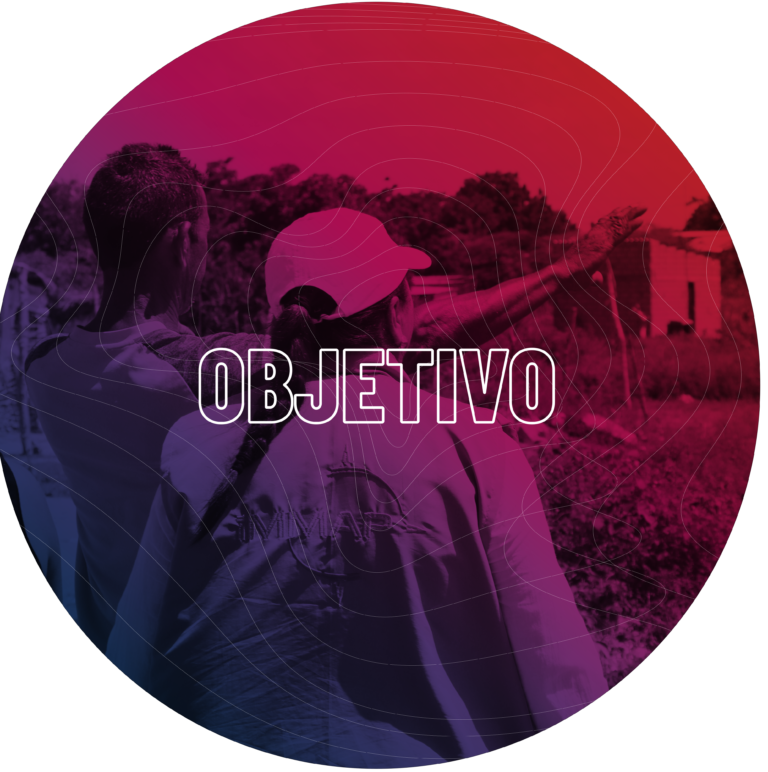
Promote the use of innovative technologies in Colombia and other humanitarian contexts to advance community engagement and the impact of humanitarian action.
In particular, the use of technologies aims to increase the participation of communities and grassroots organizations in the management of information for humanitarian assistance.
Context
Community involvement
Community engagement is a critical aspect of effective humanitarian action. It involves the inclusion of local knowledge from affected communities, enhances the accountability of humanitarian actors, empowers communities, and ensures sustainable solutions. In all phases of the humanitarian response, it is important to involve communities equitably and effectively to ensure that response efforts are tailored to their actual needs.
Technological innovation
Technology has a vital role in enabling community participation in humanitarian action. Various methods of technology can be employed, including mobile devices and online platforms, to collect feedback and data from communities, support community-led initiatives, disseminate information about humanitarian response efforts, mobilize advocacy, and improve decision-making at the community level. By utilizing these approaches, humanitarian action can be made more effective, accountable, and sustainable. In sum, these methods are serving to provide innovative solutions for information management, monitoring and evaluation, accountability, communication and coordination, access to basic services, and community empowerment.
Situación humanitaria en Colombia
In the Colombian context, the convergence of factors such as the increase in armed conflict, violence in remote areas, climate-related disasters, socioeconomic needs generated by COVID-19, and limited institutional capacities to address the massive arrival of refugees and migrants have led to a deterioration of the humanitarian context in the country. Currently, an estimated 7.7 million people are in need, with 7.2 million living in rural areas under the influence of non-state armed groups.
Given the above, Colombia persists as a complex humanitarian context in which it is crucial to discuss the application of innovative and proven technologies to enable or enhance humanitarian action, especially by involving communities in strategic decision-making.
Topics
Topic 1: State of emerging and innovative technologies for community engagement
- Emerging technologies with promising applications (e.g., AI-enabled chatbots, AI-enabled analysis or writing, high-resolution or near-real-time satellite imagery)
- Technological innovation (tools or applications) from affected populations or small and local companies
- New challenges or opportunities for proven and tested technologies for community engagement (e.g., GIS, surveys and data collection, remote web-based micro-surveys, cash transfers via SMS, crowdsourcing, crisis mapping, social media data for population movements, remote detection)
- Current state of community engagement in Colombia and globally, and application of minimum standards, monitoring and evaluation frameworks, guidelines, and tools for community engagement
- Gaps between the discourse of community engagement and related concepts such as accountability to affected populations (AAP), and its application both in the field and in strategic decision-making, and obstacles or opportunities to overcome such gaps
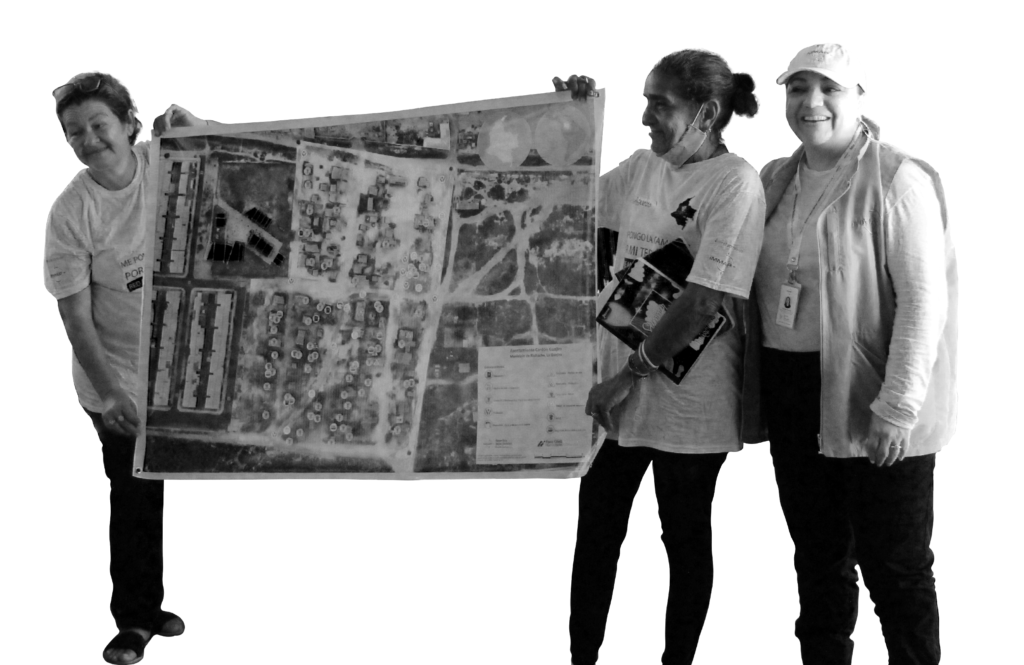
Topic 2: Technology applications to enhance community engagement
- Best practices and capacity-building with grassroots organizations to use technology
- Processes to identify and strengthen the capacity of communities to use technology
- Digital transformation and other technological processes of humanitarian organizations for greater efficiency and transparency in AAP
- Cases of technology that enhances bidirectional communications between humanitarian organizations and communities
- Cases of technology that enhances community participation, inclusion, leadership, and empowerment
Topic 3: Special considerations for the application of technology in emergencies and complex contexts
- Ethical dilemmas of technology and data in humanitarian action (e.g. transparency and accountability in handling information, equity in access to technology and information, and sustainability and long-term continuity of technology and data).
- Data protection, privacy, and security when testing and implementing technological innovations in complex, remote, and hard-to-reach environments: complex urban landscapes, socio-natural disasters (early warning, rapid assessments, response coordination)
- Free, subsidized, or low-tech tools, or considerations of cost versus proven or potential usefulness.
- Reliance on external technology providers in relation to localization objectives (role of technology in Grand Bargain, remote data collection versus use of community-based enumerators, leveraging technology providers as a strategic advantage of large INGOs). en la comunidad, aprovechamiento de los proveedores de tecnología como una ventaja estratégica de las grandes ONGI)
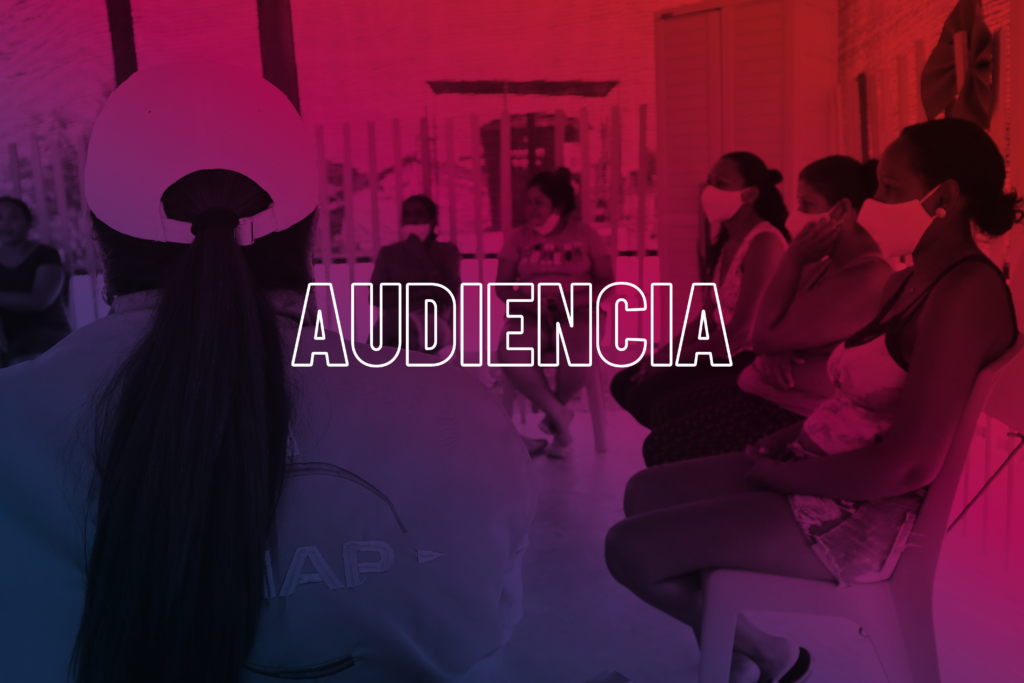
- Decision-makers
- Information management officers
- Humanitarian community in Colombia and other humanitarian contexts
- Technology service providers with humanitarian applications
This is a free event that welcomes all those who want to know more about using technological innovation to empower community engagement

